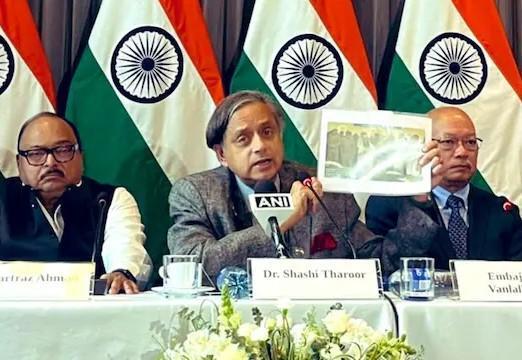
No Equivalence between Pakistan and India: Tharoor on Colombia’s Reaction on Op Sindoor
The recent visit of the Colombian delegation to India was marked by a significant development that has left many wondering about the priorities of the South American nation. The delegation, which included Colombian Senator Iván Cepeda and Representative Gina Parody, announced that they would be condoling the loss of lives in Pakistan due to Operation Sindoor, a military operation carried out by India in response to the Pulwama terror attack.
However, not everyone was pleased with this decision, particularly Congress MP Shashi Tharoor, who minced no words in expressing his disappointment and discontent. In an interview, Tharoor stated that India was “disappointed” with Colombia’s decision to condole the loss of lives in Pakistan rather than sympathizing with Indian victims of terrorism.
Tharoor’s sentiments are not surprising, given the context of the situation. Operation Sindoor was a necessary response to the Pulwama terror attack, which claimed the lives of 40 Indian security personnel. The attack was carried out by a Pakistan-based terrorist organization, and Pakistan’s role in supporting and harboring terrorism has been well-documented.
Tharoor’s criticism of Colombia’s decision is not limited to the fact that they are condoning the actions of Pakistan, a nation that has a history of promoting terrorism and violence. He also emphasized that there can be no equivalence between those who dispatch terrorists and those who resist, those who attack and those who defend.
“We’re exercising our right of self-defence,” Tharoor said, reiterating the position taken by India. “We cannot be expected to sit idly by while our soldiers and citizens are being attacked. Operation Sindoor was a necessary response to the Pulwama attack, and we will not be swayed by attempts to equate the actions of Pakistan with our own response.”
Tharoor’s comments have sparked a heated debate about the nature of international diplomacy and the priorities of nations. Some have argued that Colombia’s decision is a reflection of the country’s desire to maintain good relations with Pakistan, which has been a major partner in the Belt and Road Initiative (BRI) and other international projects.
However, others have pointed out that Colombia’s decision is a clear indication of a lack of understanding about the nature of terrorism and the threats that it poses to global security. By condoning Pakistan’s actions, Colombia is inadvertently legitimizing the use of terrorism as a means of achieving political goals.
The implications of Colombia’s decision are far-reaching, and it is likely to have a significant impact on the country’s relations with India. The Indian government has already made it clear that it will not tolerate any attempts to equate the actions of Pakistan with its own response to terrorism.
In the aftermath of the Pulwama attack, India has taken several measures to counter the threat of terrorism, including the revocation of Article 370, which granted special status to Jammu and Kashmir. The government has also launched a number of military operations against terrorist organizations, including Operation Sindoor.
Tharoor’s comments are a reminder that the fight against terrorism is not limited to military action alone. It also requires a strong diplomatic push to isolate and condemn nations that support and harbor terrorism.
In conclusion, Tharoor’s criticism of Colombia’s decision is a timely reminder of the need for nations to prioritize the fight against terrorism above all else. The international community must recognize that there can be no equivalence between those who dispatch terrorists and those who resist, those who attack and those who defend.
As Tharoor pointed out, India is exercising its right of self-defence, and it will not be swayed by attempts to equate the actions of Pakistan with its own response. The world needs to stand with India in this fight against terrorism, and condemn Pakistan’s actions in the strongest possible terms.



